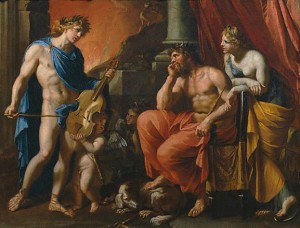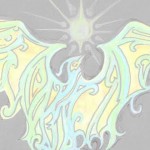To the left side of Hades’ palace is a spring;
close by stands a ghostly cypress tree.
Here, souls descending to the underworld may dissolve.
Do not approach this spring;
go on to the spring of chill waters from the Lake of Memory.
The Guardians there will interrogate you;
asking what you seek in the gloomy underworld.
Say: ‘I am a child of Earth and of starry Heaven,
but my lineage is of Heaven: this you know yourselves,
and I am parched with thirst and perishing;
refresh me with the waters from the Lake of Memory.’
And they will present you to King Hades,
and give you drink from Memory’s lake.
And then you will follow the sacred path
that many other renowned initiates take.From golden tablets buried with initiates of the Orpheus Mysteries, c.2,500 years ago. Translation based on W.K.C. Guthrie. (1952). Orpheus and Greek Religion. Princeton University Press: Princeton, pp. 172-173.
In many ancient traditions, the gift of human consciousness must be stolen from the Gods. Prometheus steals heavenly fire. Eve takes the forbidden apple. When we partake of the forbidden divine substance, we gain a precious gift. We become as the gods; we attain self-awareness. But in most mythologies, those who defy the gods and steal the forbidden treasure are cursed. They suffer terrible punishments. Prometheus is condemned to be chained to a rock; his liver torn out and devoured by eagles for all eternity. For the ancient Greeks, the liver was the source of emotions. The gift of consciousness brings emotional torment.
Acknowledging our mortality
Why does consciousness awareness bring such pain? As a species we have become god-like in our ability to create the world in which we live and to be aware of our own existence. We have become as the gods; but we do not become gods. Unlike gods, we have frail physical bodies. We have the self-awareness of the divine, but the fragility of a beautiful flower that blooms for only a short time before it is blown away on the wind. We may incarnate again but the ‘I’ that exists now, formed by genetic inheritance and the experiences of this current lifetime, is transitory. Our consciousness and sense of self are dependent on the physical brain and one day that brain will no longer function. This knowledge can cause us anguish and despair – it is difficult to let go of the self that we have always known – or we can acknowledge and accept our destiny and value this incarnation all the more because it is so short. Time passes, youth fades, illness and ageing come. This is the fate of all us, a shared human ending. Even the richest of us like Steve Jobs cannot escape the inevitability of death.
Spirituality and death

How can our Pagan spirituality help us deal with mortality? All spiritual traditions try to reconcile us with the inevitability of the ending of our lives and the lives of those we love. Beliefs about the afterlife are important and a source of comfort and inspiration to live our lives well. The initiatory mysteries of later Paganism, such as the mysteries of Orpheus, taught that we might reincarnate in other times and places, or we could live on in the Otherworld. Reincarnation is a belief shared by many Pagans today; but we do not need to believe in a personal afterlife for our lives to be meaningful. If we can de-centre ourselves from the ego and a need for a personal afterlife, we need worry even less about death. All ties that bind us to this incarnation in time will fade; but released from the body, our dreams, hopes, memories and visions will have fed the human collective psyche and contributed to its evolution. The life-force, of which we are part, will go forward, creating life in new and ever more diverse forms. As human beings we live in the privileged position of being aware of the great cosmic experiment of which we are a part. We are of the process and also in the process. We can rejoice that the great process exists, even if our part in it is very small.
Thinking about Samhain
As we enter the season of Samhain, our festivals for the dead can help us. We are reminded to take time to honor those who have already gone forward into the great mystery of death. We remember them and cherish our shared experiences together. We can visit graves and monuments of those we have loved and respected. And most of all we can during the season of death honor the living whom we love and cherish; for we know that at some point we must part, even if only to be reunited again in the future.
Festivals for the dead remind us of our own mortality. We can honor life at this time by preparing ourselves for death. If we died tomorrow, would our family know what to do with our spiritual artifacts? Are our funeral wishes clear? We may not be concerned about funeral arrangements on our own account, or what happens to our body; but it is less stressful for those who must deal with them, if we have planned a funeral that will comfort family and friends, both Pagan and non-Pagan, and they know that they are disposing of our body as we would have wished.
And let us honor death by making the most of life. We can enjoy life in the body even more if remind ourselves that our time is finite. The fact that ‘I’ will one day not wake to see the sunrise, hear the birds sing, feel the warm breeze, or smell the spring blossom, means that it is even more important to be fully present in each moment, appreciating what is around us. Each moment is supremely valuable. Whether we are happy or sad, in health or pain, each moment of our existence is unique and can never be repeated.
Life is short: live it now
Samhain is spoken of as a ‘gateway between the worlds’. It is a time of transition. Can it become for us a time to pass into a phase of our lives when we live each moment fully? Can it be a time for us to do things we have always planned, but have never found time to do: to visit that special sacred site, to visit an elderly relative, to have a child, to study, to write that novel we have dreamed about, to downsize and earn our living in a way that matches our values?
Whatever it is, maybe we should not wait. We do not know if we will see another Samhain. Life is short: let us live it now.
















